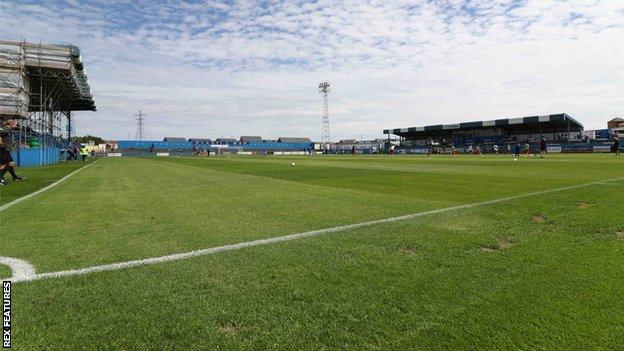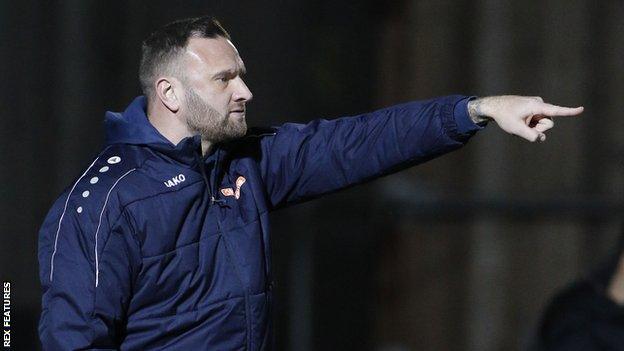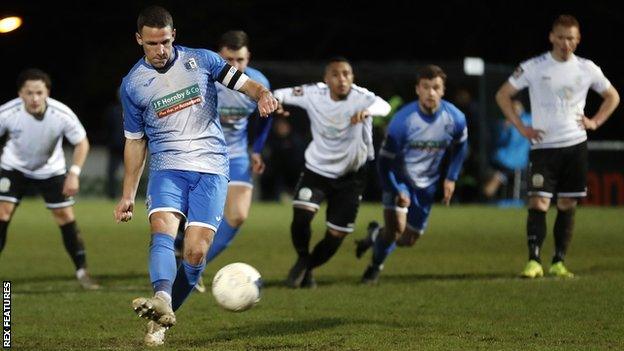Barrow: The Bluebirds’ 48-year wait from being voted out to being voted back into the Football League
- Published

Holker Street has been Barrow's home since 1909, eight years after the club were founded
They have long memories in Barrow, some of them rather painful, bitter ones.
But, 48 years on from being cruelly voted out of the Football League, the Bluebirds are back. Promoted in the only true fitting manner - by a vote.
A memorable 2019-20 National League season, in which Barrow had been leaders for four successive months, looked as if it might after all end in frustration when the season was suspended in March because of the coronavirus pandemic.
Would the season ever restart? And, if so, how might it be settled?
On Wednesday evening, finally, Barrow got their answer. The National League clubs voted. And, subject to getting approval from the Football Association, it meant promotion at last for Ian Evatt's men.
But what a long journey it has been. In all, 2,075 matches, 48 seasons, 30 managers and, in the 41 years since the English non-league football pyramid was created in 1979, more time since spent in the sixth tier than in the fifth.
In fact, since Barrow got voted out in 1972, the team who replaced them, Hereford United, have been and gone twice from the league in that intervening period - and gone bust.
Barrow's long wait over - Evatt
Barrow have been waiting since April to learn whether or not they would win promotion after clubs voted to end the National League season.
But boss Evatt felt justice had been done by his side being declared champions on a points-per-game basis.
"It's been a bit of a long wait but we got there in the end," he told BBC Radio Cumbria. "I'm so proud of everybody, not just my players and the staff but the board and the fans, the whole community in Barrow. It means so much to everybody.
"At times it's been frustrating, at times we've had to show patience but one thing we have done is show a lot of class. We only spoke about our own [club] and put our own argument forward and I think that came to fruition in the end with the support the vote got.
"I only feel it was right. I said all along that you should reward success and we were top for four months. This isn't any fluke, we deserve to be where we want to be and where we're going, it's as simple as that.
"The lads have deserved it and we've been the best team this season."
How did Barrow get voted out?
Barrow did not even finish bottom of the Football League the year they got voted out.
The annual vote was pretty much seen throughout the game back then as a private gentleman's club, by which old pals voted for each other to the continued exclusion of new teams trying to break through.
But, by virtue of a rather isolated geographical position, still an hour's drive from Junction 36 on the M6, Barrow were maybe more at risk than most.
This time they came 22nd, ahead of both Stockport County and bottom club Crewe Alexandra.
It was just that the Bluebirds had the bad luck to do it in the year that Ronnie Radford's famous rocket shot of an equaliser and Ricky George's less famous winner in front of the Match of the Day cameras had helped Hereford beat Newcastle in the FA Cup.
Such was the groundswell of support for the Bulls that one of the four clubs up for re-election was always likely to be under threat - and so it proved. Barrow picked up the least votes of the four league clubs, to tie with Hereford. But, on the second ballot, the Bulls beat the Bluebirds.
And get back in?
The immediate years following relegation were tough.
In Barrow's first five seasons in the Northern Premier League, they failed to finish higher than 21st and they were considered fortunate when, after finishing 16th in 1979, they were offered a place in the inaugural Alliance Premier League, English football's first 'fifth division'.
Even then, it was a level that they failed to flourish at, being relegated to the sixth tier five times before coming back up under Darren Edmondson in 2015 - and then enjoying their highest finish since leaving the league when they came seventh under Paul Cox in 2017.
But then followed a nightmare season, in which the Bluebirds used four managers - Cox, Micky Moore, Neil Hornby and Ady Pennock.
In fact, despite losing at home to already relegated Chester on the final day of the season, they survived by a whisker, simply because Woking, who needed to win, lost against Dover.
Evatt entered Holker Street to inherit a squad of just seven players, of which three had been signed that summer by the board, on the say-so of a scout, two had been made available for free transfers, Joel Dixon who was suffering with a long-term injury, and one local youngster.
The only way was up

Former Blackpool defender Ian Evatt has led Barrow to promotion in his first full managerial role
But, right from the start, former Blackpool defender Evatt had ambitions to restore Holker Street to English league football's map.
A rocky patch came in October 2018 when, following an FA Cup fourth qualifying round defeat by Chorley, Barrow-born Texas-based Paul Casson, the club's owner, announced that he was pulling out, leaving chief sponsor Paul Hornby to take the reins.
Hornby's first task was to assemble a board of directors and investors to simply get to the end of the season.
Alongside three other locally-born businessmen, Hornby put in 90% of a £500,000 investment, with the final 10% coming from local supporters, The Bluebirds Trust. And, on the pitch, things stabilised, as Evatt led Barrow to 10th by the end of 2018-19 season.
Having this time retained 12 players from the previous season, he made that up to a more rounded 20-man squad. And, after a slow start, results started coming, with an amazing five-month run of just one defeat in 23 league games from early September, which helped the Bluebirds soar.
They first went top with a 3-0 win at Notts County on 16 November - and have stayed there ever since.
The success has brought club and town - listed as one of the UK's five unhappiest places in a 2014 survey by the Office for National Statistics - together too, despite the squad living and training elsewhere in the north west.
"It's massive, because we're not in Barrow, myself and the players, we don't sense it as much," added Evatt.
"But we have sensed over the course of the season the whole community get behind us. They've showed they're proud of the football club again and we're ever so proud of them as well.
"We've really come together, we've created that perfect storm. I'm so pleased for the fans who have stuck with us through thick and thin because we unjustly got relegated 48 years ago and now we're back, and no-one can stop us - that's the most pleasing thing."
How Evatt built 'Barra-celona'
Analysis - BBC Radio Cumbria's Adam Johnson
The biggest task for Ian Evatt was to bring the club back to the people of Barrow after years of discontent.
Just keeping Barrow up in 2018-19 was a great season in the eyes of the support but not to Evatt. He felt they had fallen below par - he wanted promotion.
He set out again to push the club on, backed by the board and the help of volunteer fans who set out to improve the facilities at Holker Street to aid the club's capacity and cash-flow issues.
The brand of football helped: slick, possession-based football which helped get the club branded 'Barra-celona' by supporters and press.
But, despite a poor start to the season, when they only picked up seven points from the first nine games, Evatt never shied from that philosophy.
With that run of results, and an exciting brand of football, the crowds have come back too. The club have broken 50-year-old attendance figures.
The Rooney factor
One nice spin-off from Barrow's promotion is the achievement of goalscoring midfielder John Rooney, who, although two divisions lower, may now finally be in the same league next season as his better-known big brother - former Manchester United and England, and now Derby County captain Wayne Rooney.
Rooney Jr was last at this level as a teenager when he spent two and a bit seasons in League Two with Macclesfield, from March 2008 to April 2010.

John Rooney has scored 19 times in 39 appearances from midfield for Barrow this season - comfortably his best campaign tally
He then tried his luck in America, playing for New York Red Bulls in Major League Soccer, then Orlando City in the United Soccer League.
He came back to England in October 2012 with Barnsley, but he did not get a game before stepping back into non-league, with Chester, Wrexham and Guiseley before moving on to Barrow as one of Evatt's first signings in July 2018.
And he has proved a real hit, netting 10 times in his first season, before a further 19 this time, just one behind top scorer Scott Quigley.